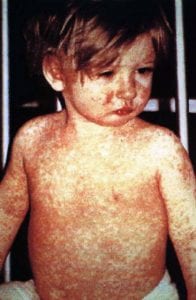Measles: Call It A Comeback
 Measles is making a comeback in the United States. Measles was declared eliminated from this country in 2000, however, according to the Centers for Disease Control and Prevention, over 764 people in the United States have contracted the measles virus from January 1- May 3, 2019. This outbreak has been reported in 23 states. The latest state to report to the CDC is Pennsylvania.
Measles is making a comeback in the United States. Measles was declared eliminated from this country in 2000, however, according to the Centers for Disease Control and Prevention, over 764 people in the United States have contracted the measles virus from January 1- May 3, 2019. This outbreak has been reported in 23 states. The latest state to report to the CDC is Pennsylvania.
Factors driving the increase in measles cases include international travel in unvaccinated persons and the large number of caregivers who have chosen not to get their children immunized. Unvaccinated persons traveling to Israel, Ukraine, and the Philippines where large measles outbreaks are occurring, have introduced measles into their stateside communities when they return.
All 50 states require immunizations for children attending public school unless they have a medical exemption. Most states allow religious vaccine exemptions. Maine, as well as 17 other states, currently allow parents to opt out of vaccines based on moral values or personal beliefs. Maine’s state legislature will soon introduce a bill to prohibit religious or personal vaccine exemptions. The state has one of the lowest vaccine rates in the country. According to the CDC, 2 percent of kindergartners have non- medical exemption from vaccination. Maine has one of the lowest vaccination rates in the country; 5 percent of kindergarten students have non-medical vaccine exemptions. Mississippi, West Virginia, and California bar all non-medical vaccine exemptions.
There are approximately 500,000 people in the U.S. who can’t be vaccinated because they have weak immune systems or severe allergies. They rely on herd immunity; (others in their community who are vaccinated) to keep them safe. Babies who are too young for the measles vaccine also rely on herd immunity. The World Health Organization recommends that at least 95% of a community be immunized against measles to protect babies and people with compromised immune systems.
The CDC defines an outbreak as 3 or more cases. New York has claimed the largest measles outbreak this year with approximately 300 cases concentrated in an orthodox Jewish community in Brooklyn’s Williamsburg community. Rockland County also has a measles outbreak. New York’s Mayor DeBlasio declared a public health emergency requiring parents to get their children vaccinated against the measles. Some parents are suing the city’s health department to block the order.
The measles virus can be spread through the air by coughing and sneezing. Unvaccinated babies or persons breathe the contaminated air or touch contaminated surfaces. People are contagious 4 days before the rash develops and continue to be contagious 4 days after the onset of the rash.
Symptoms develop 1-2 weeks after exposure. The symptoms include cough, red eyes, runny nose, and a rash that spreads from the scalp and face to the body. The red rash appears to run together. White spots appear in the mouth along with a fever of 101-102 degrees initially. Fevers may spike to 104 degrees 3 -5 days after symptoms appear.
The measles virus is not a benign childhood illness. Complications include lung infection. Pneumonia is a common cause of death in young children who contract measles. Brain swelling is also a complication of measles. This may cause seizures, developmental delay or hearing loss.
The MMR vaccine provides protection against (measles, mumps, and rubella). Two doses of the vaccine should be given. The first dose should be given at 12 months of age to 15 months, and the second dose should be given at 4 years of age to 6 years of age. Two doses are 97% effective according to the CDC and one dose is 93% effective against measles. Teens and adults should make sure their immunizations are up to date.
Contracting the measles virus can have serious consequences. Don’t let measles make a comeback. Let’s all do our part for the greater good.
